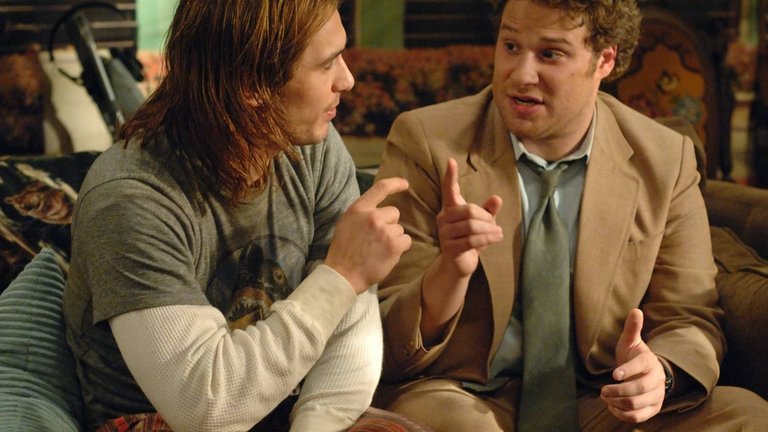
In the not-so-distant past, cannabis use for recreational purposes was considered anti-establishment and "edgy" in the Western world. This unique social context allowed Hollywood to produce comedies centered around cannabis use, with Pineapple Express (2008) being one such film directed by David Gordon Green. While many films in this genre now seem like relics of a bygone era due to cannabis' integration into mainstream culture, Pineapple Express remains a popular and entertaining title that was a box-office hit, despite receiving mixed critical reviews.
The film's premise is inspired by the character of Floyd, dazed stoner played by Brad Pitt in the 1993 film True Romance. Producer Judd Apatow wondered what would happen if characters like Floyd were pursued by murderous gangsters. Screenwriters Seth Rogen and Evan Goldberg, who had previously penned the hit comedy Superbad, took on the task of developing the script.
The protagonist, Dale Denton, played by Rogen, is a 25-year-old process server who uses marijuana to cope with the monotony and stress of his job. He becomes a regular customer of Saul Silver, a laid-back dealer played by James Franco, who considers Dale his friend. One day, Saul offers Dale a new, potent strain called "Pineapple Express," which Dale smokes just before his next assignment, involving serving papers to Ted Jones (played by Gary Cole), a local drug lord. Dale witnesses Ted and corrupt policewoman Carol Brazier (played by Rosie Perez) murder a man while under the influence of the "Pineapple Express." Dale flees the scene but leaves traces of the drug behind, which Ted recognizes and sends his henchmen after Saul. Dale seeks Saul's help, and they both realize they must go on the run to escape danger.
Upon its release, Pineapple Express achieved substantial box office success but received mixed reviews from critics. Many were conflicted about its unusual blend of 1970s stoner comedy with Tarantino-esque black humour and an action film aesthetic reminiscent of the 1980s. This genre-blending approach left some viewers unsure of how to interpret the film's tone and intent.
Critics pointed out that the humour in Pineapple Express was often uneven, echoing a common critique of stoner comedies: that their jokes resonate best with audiences who have indulged in similar substances. While some criticisms hold merit—such as the inclusion of an unnecessary prologue set in 1937 that attempts to explain why US government banned cannabis—there are undeniably funny moments throughout the film. However, it is fair to say that Pineapple Express does not deliver non-stop laughter; rather, it offers sporadic chuckles interspersed with action sequences.
In an effort to compensate for its occasional lack of humour, the film escalates its action and violence levels, particularly in its latter half. The graphic nature of some scenes may be jarring for viewers expecting a traditional comedy. Nevertheless, given its mature audience target demographic, those who appreciate Quentin Tarantino’s films might find themselves more forgiving of this tonal shift.
David Gordon Green’s choice as director raised eyebrows initially; known for his work on prestigious art dramas and considered a protégé of Terrence Malick, Green seemed an unconventional fit for an Apatow production. However, he successfully infused Pineapple Express with strong cinematography and pacing that kept audiences engaged throughout its nearly two-hour runtime—a feat not easily accomplished in comedies.
The film’s success can largely be attributed to its cast. Rogen and Franco bring their real-life friendship into their roles, creating palpable chemistry that elevates the material. Rogen plays the straight man in this comedic duo; while he delivers solid performances, his dialogue can occasionally come off as grating. His character’s moral ambiguity—especially regarding his high school girlfriend played by Amber Heard—adds another layer to his portrayal.
Franco’s performance as Saul Silver is particularly noteworthy; he shines in his sympathetic depiction of a kind-hearted yet naive drug dealer embodying the peace-and-love ethos of the late 1960s counterculture. His portrayal adds depth to what could have been merely another cliché character.
The supporting cast also contributes significantly to the film’s charm. Danny McBride excels as Rod, Saul’s unfortunate supplier, while Craig Robinson and Kevin Corrigan deliver effective performances as bickering henchmen. In contrast, seasoned actors like Gary Cole and Rosie Perez seem underutilised.
One aspect that distinguishes Pineapple Express from other similar comedies is its unconventional ending. In a diner scene where battered characters casually discuss their harrowing experiences over breakfast, the film concludes on an unexpectedly reflective note. This moment encapsulates stoner humour effectively—transforming what could have been merely another action-comedy into something more profound.
While Pineapple Express may not be hailed as one of cinema's most profound or meaningful works, it remains an entertaining entry within Judd Apatow's filmography. Its ability to transcend typical genre boundaries makes it accessible even to those who do not partake in cannabis culture. Ultimately, it serves as both a time capsule reflecting changing attitudes towards marijuana and an enjoyable buddy comedy that resonates with audiences across various demographics.
RATING: 7/10 (+++)
Blog in Croatian https://draxblog.com
Blog in English https://draxreview.wordpress.com/
InLeo blog https://inleo.io/@drax.leo
Hiveonboard: https://hiveonboard.com?ref=drax
Rising Star game: https://www.risingstargame.com?referrer=drax
1Inch: https://1inch.exchange/#/r/0x83823d8CCB74F828148258BB4457642124b1328e
BTC donations: 1EWxiMiP6iiG9rger3NuUSd6HByaxQWafG
ETH donations: 0xB305F144323b99e6f8b1d66f5D7DE78B498C32A7
BCH donations: qpvxw0jax79lhmvlgcldkzpqanf03r9cjv8y6gtmk9
Posted Using InLeo Alpha
